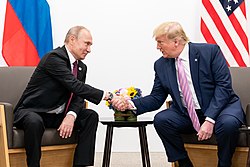| Trump–Russia relations |
|---|
 |
This is a timeline of major events in first half of 2018 related to the investigations into links between associates of Donald Trump and Russian officials that are suspected of being inappropriate, relating to Russian interference in the 2016 United States elections. It follows the timeline of Russian interference in the 2016 United States elections before and after July 2016 up until election day November 8, the transition, and the first and second halves of 2017, but precedes the second half of 2018, the first and second halves of 2019, 2020, and 2021. These events are related to, but distinct from, Russian interference in the 2018 United States elections.


























